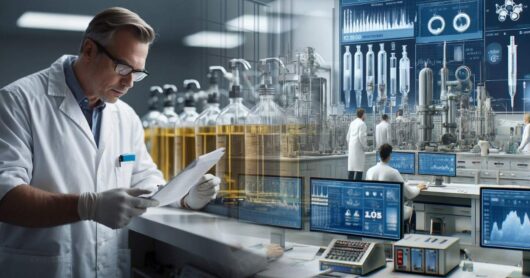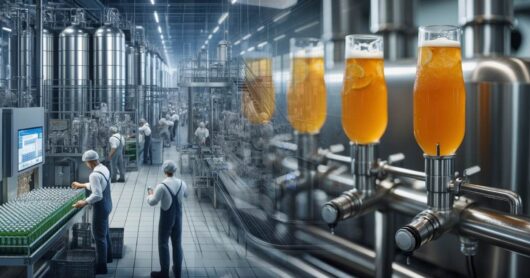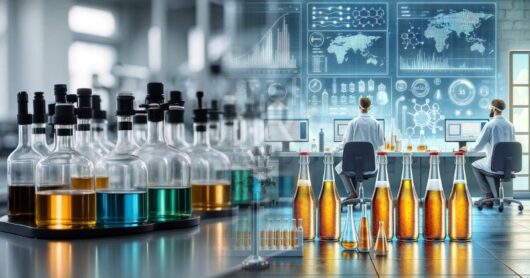In the brewing and beverage industry, your attention to CO2 purity can profoundly influence your products’ taste, quality, and overall safety. Carbon dioxide isn’t just a byproduct; in beverages, it’s a critical component that imparts the fizz and tang that define many of your favourite drinks. The carbonation process involves dissolving CO2 gas into the liquid under pressure. However, it’s not just the carbonation that matters – the quality of the gas itself is paramount. The presence of any impurities in the CO2 can lead to off-tastes and odours, unwanted changes in acidity, or even the potential for microbiological growth, compromising the integrity of the beverage.
Maintaining beverage quality starts with ensuring the CO2 used meets stringent purity standards. Different gas purity grades are tailored to various applications, but the focus is on achieving a purity level that aligns with food-grade standards for beverages. This ensures that the CO2 does not contribute any foreign contaminants that could alter the drink’s intended flavour profile or pose a health risk. As a stakeholder in the industry, upholding these standards is your responsibility, and in doing so, you preserve the drink’s desired sensory attributes and consumer safety.
Gas purity isn’t simply an operational concern; it’s a marker of your commitment to excellence. When you source CO2 for your beverage production, stipulating beverage-grade or food-grade CO2 is a critical step. Suppliers should provide a certificate of analysis with each delivery to document the gas’s compliance with established purity levels. In doing so, you are not just adhering to industry regulations but also ensuring that each bottle or can that reaches the consumer maintains the high quality they expect from your brand.
CO2 Purity and Its Significance in the Beverage Industry
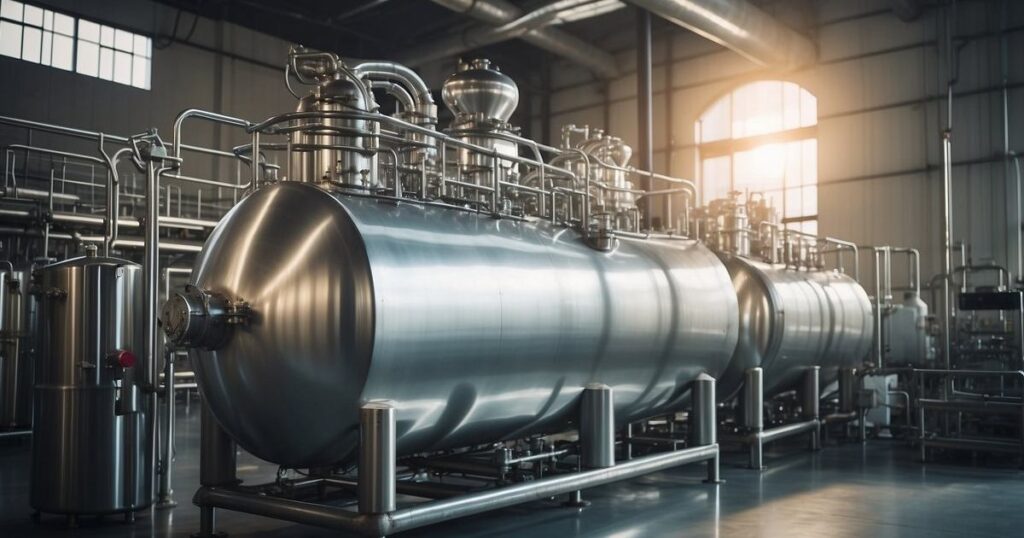
When you think of carbonated beverages, you imagine their satisfying fizz and distinctive mouthfeel. This is all thanks to carbon dioxide (CO2), but not just any CO2 will do. The purity of the CO2 is fundamental to beverage quality, ensuring the taste and safety you expect and enjoy.
Understanding CO2 Purity and Impurities
Your understanding of CO2 purity begins with recognising that contaminants can influence the beverage’s flavour and safety. Trace impurities range from hydrocarbons to benzene and acetaldehyde, all of which must be monitored closely to maintain CO2 purity.
Standards and Regulations Governing Beverage CO2
You must adhere to rigorous standards set by organisations like the ISBT and EIGA. These ensure that the carbon dioxide used in beverages is of the highest purity, safeguarding the quality and safety of your products.
Effects of CO2 Impurities on Beverage Quality
Impurities in CO2 can result in off-flavours, affecting taste and even potentially causing health concerns. As a consumer, you should be aware that the slightest presence of contaminants can compromise your beverage’s quality.
CO2 Sourcing and Production for Beverage Use
You should know that CO2 for beverages is often obtained as a by-product of industries like ethanol and petrochemical production. CO2 suppliers and beverage manufacturers work together to ensure that this CO2 meets the gas purity standards for safe consumption.
CO2 Quality Assurance and Analysis Methods
Your beverage manufacturers rely on advanced analysis methods, like gas chromatography and FTIR gas analysers, to ensure that CO2 purity is not compromised. These technologies offer a precise assessment of CO2 quality, safeguarding your drink.
Mitigation Strategies for CO2 Contamination
Manufacturers implement strict quality management practices to avoid contamination of CO2. This includes regular maintenance and checks of storage vessels and high-pressure cylinders to ensure the CO2 remains uncontaminated during storage and handling.
The Role of Food Safety and Consumer Health
Your health is paramount, making CO2 purity a critical aspect of food safety. The beverage industry ensures compliance with health and safety standards by delivering food-grade CO2 to prevent harmful effects from impure gases.
Advanced Technologies in CO2 Purity Analysis
You benefit from advancements in technology, such as gas analyzers capable of measuring CO2 purity and impurities down to parts per billion, reflecting the beverage industry’s commitment to ensuring the CO2 used meets the highest purity standards.
Operational Considerations for CO2 Storage and Handling
The way CO2 is stored and handled directly affects its purity. Your beverage manufacturers are careful to maintain the correct temperature and pressure in storage tanks to protect the CO2’s integrity until it’s used for carbonation.
The Economic and Supply Chain Aspects of Beverage CO2
You should be conscious of how supply risks can affect the availability and cost of pure CO2. Manufacturers must manage these risks to maintain a steady supply of high-quality CO2, which is critical for preserving beverage quality and production continuity.
Emerging Trends and Research in CO2 Purity
Ongoing research in CO2 purity and carbonation technology keeps beverages safe and enjoyable. Technological advancements continue to improve how CO2 purity is assessed and maintained in the beverage industry.
Implementation of Quality Management Systems
Your assurance of CO2 purity comes from effectively implementing quality management systems. Manufacturers often attain ISO certifications to demonstrate their commitment to maintaining the highest standards in CO2 quality management.
Health and Safety Standards in CO2 Use
The standards for CO2 in the beverage industry, like those from the Compressed Gas Association, ensure that the CO2 is bone dry and free of impurities, protecting both your health and the quality of your beverages. These strict guidelines are adhered to for your safety and satisfaction.
Beverage CO2 Handling and Maintenance
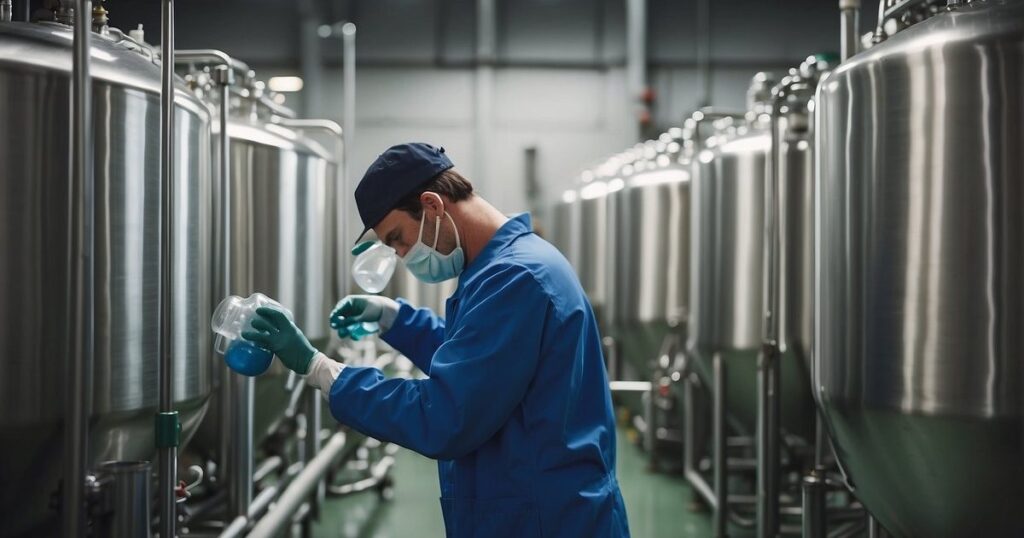
The maintenance and handling of CO2 in beverages are critical to preserving the purity that ensures the desired quality and safety standards. Adhering to recommended practices can protect the integrity of the CO2 used throughout the process.
CO2 Handling Techniques and Best Practices
When handling CO2 for beverage production, use high-pressure cylinders or bulk CO2 systems with appropriate regulators. Ensure that all cylinders are stored upright and secured to prevent tipping. Implement strict procedures for cylinder inspection, encompassing checks for rust, dents, and proper labelling. Before connecting cylinders to dispensing systems, verify that the CO2 purity grades meet the minimum standard of 99.90% purity for beverage quality.
- Checklist for CO2 Cylinder Handling:
- Inspect cylinders for physical damage
- Confirm labels and purity grades
- Secure cylinders upright
- Use correct regulators
Maintaining CO2 Purity During Transportation and Storage
During transportation and storage, maintain CO2 below specific temperatures to prevent adversely affecting its purity. Secure the vessels properly and limit exposure to contaminants. It is recommended that a certificate of analysis be obtained to confirm gas purity before use in beverages.
- Key Points for Transportation and Storage:
- Keep CO2 at stable, low temperatures
- Avoid exposure to contaminants
- Obtain and review the certificate of analysis
- Use dedicated, clean, and labelled storage vessels
Ensuring Regular Maintenance and Quality Control
Regular maintenance, performed by trained technicians, is your safeguard against contaminants compromising CO2 purity. Systems should be periodically tested using methods capable of detecting trace impurities. Embrace a culture of quality assurance: establish a routine for replacing filters and servicing equipment. Quality control is your line of defence to maintain the standard required for beverage quality.
- Maintenance Routine Elements:
- Scheduled equipment servicing
- Filter replacement at regular intervals
- Frequent purity testing
- Adherence to quality management systems
Frequently Asked Questions
Achieving high CO2 purity levels is essential for the taste, quality, and safety of beverages. This section addresses your most pressing inquiries about CO2 purity in the beverage industry.
What specifications define beverage-grade CO2?
Beverage-grade CO2 is defined by specific standards that ensure its quality and suitability for use in drinks. These specifications include a minimum purity level of 99.9% and stringent limits on contaminants like benzene, sulfur, and hydrocarbons, which can affect both taste and safety.
How does food-grade CO2 differ from industrial-grade CO2?
Food-grade CO2 must adhere to higher purity standards because it comes into direct contact with the consumables you ingest. This means it contains fewer impurities and toxic compounds compared to industrial-grade CO2, which may have permissible levels of contaminants that are unsuitable for consumption.
What are the consequences of using CO2 with insufficient purity in beverages?
Using CO2 with inadequate purity can introduce off-flavours, odours, and potential health hazards into your beverages. It can also affect the beverage quality by altering its carbonation and overall taste profile, leading to an unsatisfactory consumer experience.
Which regulatory standards govern the purity requirements for CO2 in the food and beverage industry?
The International Society of Beverage Technologists (ISBT) sets guidelines for CO2 purity in the beverage sector. These guidelines form the basis for regulatory standards that ensure gas purity meets specific criteria to be deemed safe and of the highest quality for beverage use.
What methods ensure CO2 meets the purity standards for beverage use?
To ensure CO2 purity, suppliers use advanced monitoring systems capable of highly precise measurements. Techniques such as sensory testing, where CO2 is bubbled through a brewing liquor to detect off-tastes or odours, and physical measurement methods for impurity detection are employed.
How is the purity level of CO2 verified before it is utilised in the beverage industry?
Before use, CO2 purity is verified using equipment like the MAX-Bev CO2 Purity Monitoring System, which precisely measures CO2 purity and impurities. Additionally, suppliers might perform sensory tests, comparing treatment results with standards, to ensure that gas quality meets the beverage industry’s requirements.
expertmixologist
+356 7939 8622
